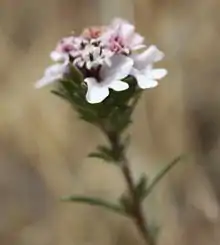Calycadenia multiglandulosa
Calycadenia multiglandulosa is a species of flowering plant in the sunflower family, known by the common names sticky calycadenia[2] and sticky western rosinweed.[3] It is endemic to California, where it is a common in the Coast Ranges and in the Sierra Nevada Foothills from Shasta County to Kern County.[4][5][6]
| Calycadenia multiglandulosa | |
|---|---|
 | |
| Scientific classification | |
| Kingdom: | |
| (unranked): | |
| (unranked): | |
| (unranked): | |
| Order: | |
| Family: | |
| Genus: | |
| Species: | C. multiglandulosa |
| Binomial name | |
| Calycadenia multiglandulosa | |
| Synonyms[1] | |
| |
Description
This is an annual herb producing an erect, hairy, glandular stem up to 70 centimeters (28 inches) tall. The leaves are linear in shape and up to 8 centimeters long. The inflorescence is a series of dense clusters of flower heads surrounded by long, narrow bracts covered in obvious bulbous glands. The sticky, glandular flower head has a center of several disc florets surrounded by a few white, yellow, or red ray florets. Each ray floret has three lobes at the tip, the middle lobe being shortest. The fruit is an achene; those developing from the disc florets have a pappus of scales.[4][5]
References
- The Plant List, Calycadenia multiglandulosa DC.
- "BSBI List 2007". Botanical Society of Britain and Ireland. Archived from the original (xls) on 2015-01-25. Retrieved 2014-10-17.
- "Calycadenia multiglandulosa". Natural Resources Conservation Service PLANTS Database. USDA. Retrieved 10 January 2016.
- Calycadenia multiglandulosa. Flora of North America.
- Calycadenia multiglandulosa. The Jepson eFlora 2013.
- Calflora taxon report, University of California, Calycadenia multiglandulosa DC., rosin weed, sticky calycadenia, sticky western rosinweed
External links
- NatureServe (2013):Calycadenia multiglandulosa
- Calycadenia multiglandulosa — Calphotos Photo gallery, University of California
